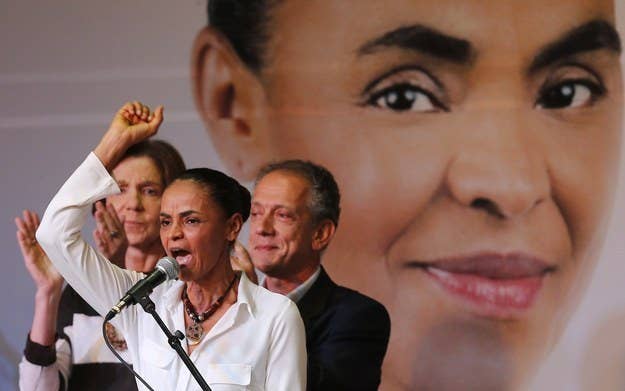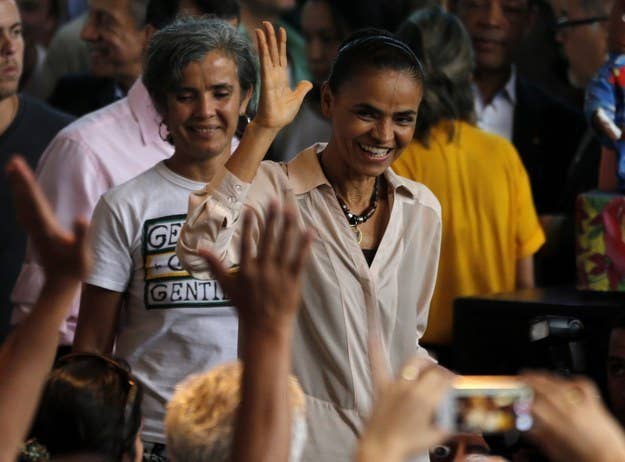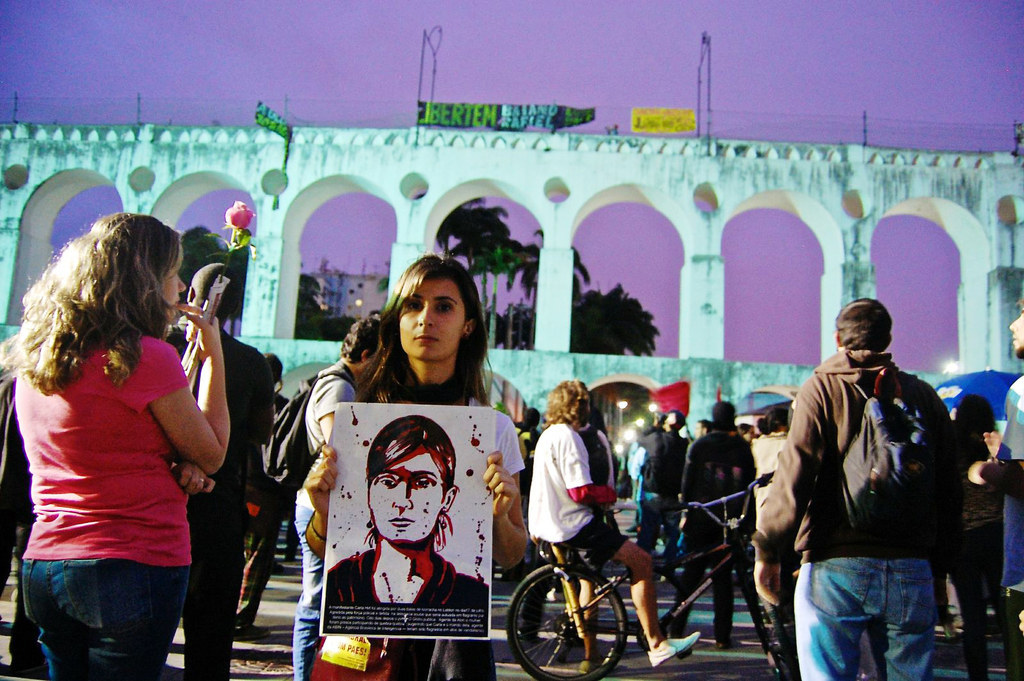
RIO DE JANEIRO — The 40 people crowded into the living room of a party-cum-workspace in a red-light district of Rio's downtown had known each other for a while. They met on the streets of Brazil and in human rights circles over the past year, as major anti-government protests dwindled down to the hardcore leftist few. They were still regularly turning out for protests, which routinely ended with violent confrontations with police.
On this night, the activists were gathered for a debate about Brazil's upcoming presidential election, a dramatic race that has seized the attention of the entire country. The organizers had managed to find a debater for five of the six top candidates. The only one missing? The woman many would think would find a natural base among the people gathered here: challenger Marina Silva, an environmental activist who, if she wins, will be the country's first Afro-Brazilian president and a break from the two parties that have controlled the presidency for nearly two decades.
Silva, whose life story, charisma, and pledge to do politics in a "new" way have prompted comparisons to Barack Obama, is widely expected to meet incumbent Dilma Rousseff in a runoff after the first round of voting on Oct. 5. Even then, she would find few supporters in this room of lefties and protesters. Asked who they would vote for in a runoff, only five people in the room raised their hands for Silva, despite the fact that many blamed the Rousseff government for the Rio police's crackdown — with tear gas and rubber bullets — on the very protests they attend.
"We were not able to find a Marina voter!" said the debate moderator, Rafucko, a popular leftist YouTube comedian who came dressed in drag that night. Those gathered laughed.
Marina Silva has for years been a favorite in international environmental activism circles and a household name among Brazilians, who see her as someone who in her politics and personal life represents one of the main debates in their rapidly growing country: Development at what cost? But many in this room, comprising the new generation of Brazil's politicized youth, were now rolling their eyes over what they see as a presidential campaign that has taken a toll on her integrity.
Silva "was building this image of a saintly Obama-like figure. And then she got her hands dirty," said Marina Motta, 28, a human rights researcher at the debate. Voting for Rousseff instead, she said, "is a bit like staying on the safe side. It's the devil that you know."

Silva comes from an impoverished family of 11 children and grew up in the state of Acre, a remote corner of the Amazon. She was illiterate until her teenage years, when she contracted several tropical diseases and moved to Acre's capital, Rio Branco, in search of medical treatment. It was in Rio Branco that she began her schooling and delved into religion. She worked as a housemaid, became heavily involved in liberation theology, a radical movement in the Roman Catholic Church that advocated for social change among the poor, and later in life converted to the Pentecostal Assembly of God church. She worked alongside the environment and labor activist Chico Mendes, who was later assassinated and became a symbol of the global conservation movement, in anti-deforestation movements in the 1980s.
A union organizer herself, Silva won elections as a city councilwoman and state congresswoman before becoming a senator for Acre in 1994, and, in 2003, environment minister. In 2010, she gave a surprisingly strong performance as the third-place candidate in the presidential elections, garnering 19% of votes for the Green Party. A vice-presidential candidate on the Brazilian Socialist Party's (PSB) ticket this year, Silva suddenly found herself the wild card of the election when her running mate, Eduardo Campos, died in a plane crash in August. Brazilians know her by her raspy voice, the thin frame she still holds with poise, and the harsh seriousness that comes through even as she tries to smile and joke on the campaign trail.
She rose rapidly in the polls, which now predict a second-place finish in the first round and a neck-and-neck runoff with Rousseff. Aécio Neves, the candidate preferred by right-leaning Brazilians, is expected to endorse Silva in a runoff, boosting her chances. Yet the race is still too close to call.
The activists — a young creative crowd as exasperated with politics as they are boisterous about agitating for change — gathered for the late-night election debate, which took place about two weeks before the first round of voting, would appear to be a natural base for Silva. So why were they not on board?

Many were enthusiastic about Silva back in 2008, when she resigned as environment minister from the Workers' Party (PT) government of Luiz Inácio Lula da Silva in protest at development projects she saw as coming at the cost of Brazil's environmental well-being.
Last year, Silva tried to form a new political party called the Sustainability Network. It promised a new sort of political organizing that would go beyond traditional party politics. But after a long battle in which she was unable to get the nearly half a million signatures of valid voters required, barred by what skeptics saw as a technicality, she put herself instead on the Campos ticket for the left-leaning PSB party.
"It felt like we were building a party," said Motta. "It was like the PT my parents built." Seeing Silva with Campos felt like an "unconvincing left," making her seem "pragmatic" after what had been a "fairy tale," the human rights researcher added. "What I felt, and I think a lot of people felt, is kind of betrayed."
Marcus Galiña, 42, an activist with local artistic and political groups who participated in the same debate, had come to the decision to support Rousseff. "I think it will be a very mediocre government," he said. "But unfortunately, with what we have on the table in Brazil right now, it's what we'll have. We will be embarrassed when we vote."
In the few weeks since Silva became a candidate, she made a series of concessions that exasperated the group. After an outcry from conservative and religious groups, her campaign backed down from a proposition to support same-sex marriage and adoption rights — just 24 hours after announcing it. She also told journalists she was opposed to revising a dictatorship-era amnesty law seen as protecting torturers, even though as a senator, she had written an op-ed favoring doing so.
And perhaps the final straw: After years of cultivating an image as an ascetic who would not be lured into the decadence of Brazilian political life, Silva surprised her followers by meeting with bankers and international investors at a dinner that reportedly cost 100,000 real ($40,900) per person.
Silva's stances on issues like abortion — she avoids expressing support for broader abortion rights — and LGBT rights alienate her from Brazil's small but vocal activist groups, but resonate with a large swath of Brazilian society.
"People look from the outside and see all these people on the beach, but this is a very conservative country," said Fernando Rodrigues, a journalist and specialist in public-opinion polling. Same-sex marriage, abortion, and drug reform "are not questions present in the daily lives of Brazilians," he said, adding that there are great disparities between the progressive voices found in the country's urban centers, São Paulo and Rio, and those in its vast interior.
Silva has now found herself being supported by mega-pastors Silas Malafaia and Marco Feliciano of the Assembly of God, Brazil's largest Protestant church. Church leaders are expected to announce their official endorsement of Silva this week, abandoning Social Christian Party candidate Pastor Everaldo.

In her breakneck rush to put together a campaign, Silva seems to have paid the price of alienating the activists who emerged as the influential new political players after "June," which is how they refer to last year's anti-government protests. Activists sought a "pure" candidate, said Bruno Borges, a political scientist at the State University of Rio de Janeiro. "It's very funny when you speak with people," he said. "Some people actually believe she is from the left, some people from the right."
That volatility has taken a certain toll on Silva. In the month after becoming her party's candidate, her rejection rate among voters doubled, reaching 22% in a recent poll by Datafolha, a polling institute. Even if that indicates a growing exasperation with her candidacy, her rival Rousseff still fared worse in the same poll, with 33% of voters saying they would refuse to vote for the current president. (Brazilian law requires every Brazilian to cast a vote.)
And despite her turn toward pragmatism, Silva is counting on a large number of campaigners to still see her as outsider enough to fulfill the political reform demanded by last year's protests. She has presented herself as a reformist by proposing a one-term limit for the presidency and saying she will reduce the number of presidential ministers, currently at 39. But protesters wanted even more — a better commitment to health and education (the poor state of which has been highlighted by spending on the 2014 World Cup and 2016 Olympics), as well as a means of dealing with police violence in the favelas and an end to impunity for crimes committed by public officials.
Luan Felipe Peixoto Veloso, 20, who came from a working-class suburb of Rio called Belford Roxo and had worked as a hot-dog vendor through his teens, was one of the enthusiastic campaigners on the streets for Silva. The son of a sex worker, he complained about what he saw as decadence in the PT and impunity for corrupt public officials. "You need to have a government where the people are more human," he said.
Because of an editing error, this post incorrectly stated the value of 100,000 real. It is $40,900, not $162,400 as originally stated.
